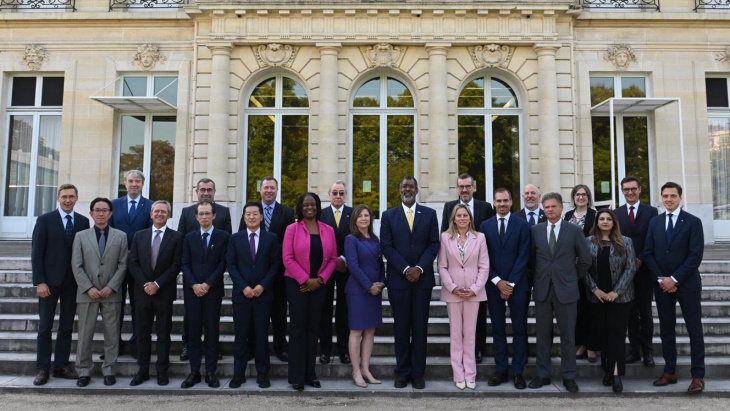Co-chaired by Swedish Deputy Prime Minister and Minister for Energy, Business and Industry, Ebba Busch, and OECD NEA Director-General William Magwood, the OECD NEA said at the event "ministers, CEOs and other leaders will discuss concrete ways to make good on global pledges to increase nuclear energy production to fight climate change".
It added: "Building on the success of Roadmaps to New Nuclear 2023, ministers, senior government officials and industry representatives will convene to share recent experiences, deliberate on best practices and chart a collaborative path towards delivering new nuclear energy construction at the scale and pace required to meet the growing global expectations for nuclear energy.
"Whereas Roadmaps 2023 provided a general direction for collective action, which was followed by a pledge by more than 20 countries at COP28 to triple global nuclear energy capacity by 2050, this second meeting will focus on critical next steps to bring solutions to the countries most interested in proceeding with nuclear new build."
The NEA said the discussions during the two-day event "will inform the development of actionable policy recommendations for policymakers, nuclear power companies and the nuclear energy sector more broadly".
The nuclear industry - represented by the Canadian Nuclear Association, Candu Owners Group, the Electric Power Research Institute, Groupement des Industriels Français de l'Energie Nucléaire (Gifen), Japan Atomic Industrial Forum, Korea Atomic Industrial Forum, Nuclear Energy Institute, nucleareurope, Nuclear Industry Association and World Nuclear Association - issued a communiqué saying: "We congratulate those OECD member states that signed the Declaration to Triple Nuclear at COP28. We urge all OECD member states to set out clear plans for nuclear energy deployment that would fulfil the targets they have set through the UNFCCC process and to demonstrate their commitment to nuclear energy, giving clear signals to markets and investors."
The associations said they recognise that meeting a tripling of nuclear capacity by "2050 will require significant expansion in access to financing, strengthening of supply chains, investment in workforce, further development of the nuclear fuel supply and supportive policies and regulations to enable rapid scaling of nuclear energy generation".
They called on governments to help maximise the use of existing nuclear power plants, including extending the operating period of reactors, uprating their output and restarting those that have shutdown where feasible. They said governments should act to accelerate deployment of new nuclear facilities based on proven designs, and accelerate the development, demonstration, and deployment of new nuclear technologies, including new large nuclear reactors as well as small modular reactors and advanced modular reactors.
The associations highlighted eight key areas in which governments must take action in order to achieve the 2050 target. These include: promoting policies to encourage fleet deployment of nuclear energy technologies; ensuring ready access to national and international climate finance mechanisms for nuclear development; ensuring that multilateral financial institutions include nuclear energy in their investment portfolios; providing clarity to investors on the funding and investment recovery mechanisms available for nuclear projects and including nuclear energy in clean energy financing mechanisms; continuing efforts to strengthen supply chains for nuclear fuel in OECD member states; investing in workforce development and training; continuing investments in nuclear research and efforts to bolster the nuclear supply chain within OECD member states; and expanding regulatory cooperation.
"The communiqué issued today congratulates those OECD member states that signed the Declaration to Triple Nuclear at COP28, and encourages other member states to join," said Sama Bilbao y León, Director General, World Nuclear Association. "The goal to triple global nuclear capacity is also shared by industry through the Net Zero Nuclear initiative highlighting government and industry collaboration. The time is now to expand nuclear capacity and provide clean, reliable and secure energy for all."
New initiative launched
The NEA announced it will create a new Joint Undertaking on Roadmaps to New Nuclear that will "bring together like-minded countries to rebuild their capability to implement successful nuclear energy new-build projects".
The initiative will focus on addressing the most pressing issues in nuclear energy, including nuclear finance, supply chain readiness and building a skilled and diverse workforce.
So far, 13 countries (Bulgaria, Canada, Czech Republic, France, Hungary, Japan, Poland, Romania, Slovenia, South Korea, Sweden, the UK and the USA) have expressed interest in the initiative.
"The Joint Undertaking on Roadmaps to New Nuclear will allow us to turn the priorities identified by Ministers and CEOs into practical actions to support the tripling of nuclear energy capacity by 2050," OECD NEA Director-General William Magwood said. "This collaborative framework will advance international cooperation, foster strategic partnerships, and exchanges among governments and industry to more effectively deliver on the national priorities of the countries pursuing new nuclear capacity."















